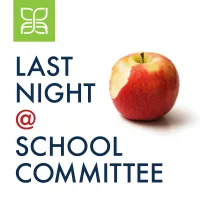Episode Description
At last night’s Boston School Committee meeting, members dove immediately into another discussion about the Exam School Admissions Policy Recommendation, foregoing the usual Superintendent’s Report. In response to committee requests from the last meeting, the district presented new simulations that gave equal weight (as opposed to 70% grades and 30% MPA score) to both GPA and MAP assessment scores. The district found that there was minimal change in the overall makeup of students admitted to exam schools.
Secondary Schools Policy Update:
The Committee then moved through grant approvals and then heard a report on secondary school policies, including graduation and vocational admissions criteria. The Committee discussed adding weighted lotteries for all vocational programs, spurring questions about the complexities of admissions for families.
District leaders outlined new competency determination requirements to align with updated state (DESE) standards for the Class of 2026 and beyond, with adjustments for multilingual learners, students with disabilities, and those with exceptional circumstances. Embedded in the district’s presentation was also a recommendation for a watered-down MassCore with a “D-” signaling mastery in certain courses. This raised concerns about expectations and abiding by the previous Committee votes to use MassCore as the graduation standard.
Additionally, the district failed to present data for the Class of 2025, prompting Member Brandon Cardet-Hernandez to question how many students are currently on track to meet graduation standards. He noted that in the presentation disseminated by the district only 41% of the Class of 2026 appears to be on pace to complete MassCore, and therefore graduate.
Summer Learning Initiatives:
Next, the Superintendent presented on Summer Learning 2025, reporting participation from 14,600 students, up 600 from the previous year. The district highlighted stronger collaboration across departments and improved multilingual family communications. However, outcomes from these summer programs were nonexistent.
Member Cardet-Hernandez questioned whether the district is truly committed to evaluating outcomes. He pressed for evidence that these expensive programs are actually closing achievement gaps. Member Skerritt echoed that same concern, asking for longitudinal tracking of student outcomes, noting that with today’s data tools, the district should be able to easily compare participants’ attendance, growth, and testing results to prior years.
MCAS and Accountability Results:
The final report of the night centered on 2025 State Assessment and Accountability Results. Superintendent Skipper cited “encouraging progress” in literacy for grades 3–8 and said Boston outperformed other large districts statewide.
But a closer look revealed troubling trends. Member Cardet-Hernandez questioned the effects of “social promotion,” advancing students who haven’t met grade-level standards, and how this impacts high school achievement. Member Skerritt then asked what proficiency targets the district is actually aiming for, suggesting BPS set clear districtwide goals through 2030.
As the below chart indicates, MCAS scores remain below pre-pandemic levels across all grades:
Despite these declines, the district framed the results as “encouraging,” a characterization that is difficult to reconcile with the data.
What’s Next:
The meeting was emblematic of the district’s current crossroads: a push for optimism and narrative control amid academic stagnation. The next meeting will be held on October 29th. We look forward to connecting with you then!
Learn more about your ad choices. Visit podcastchoices.com/adchoices
